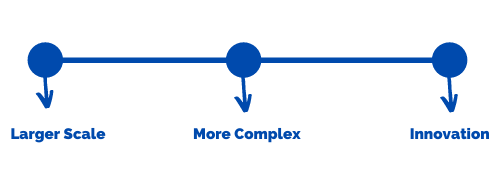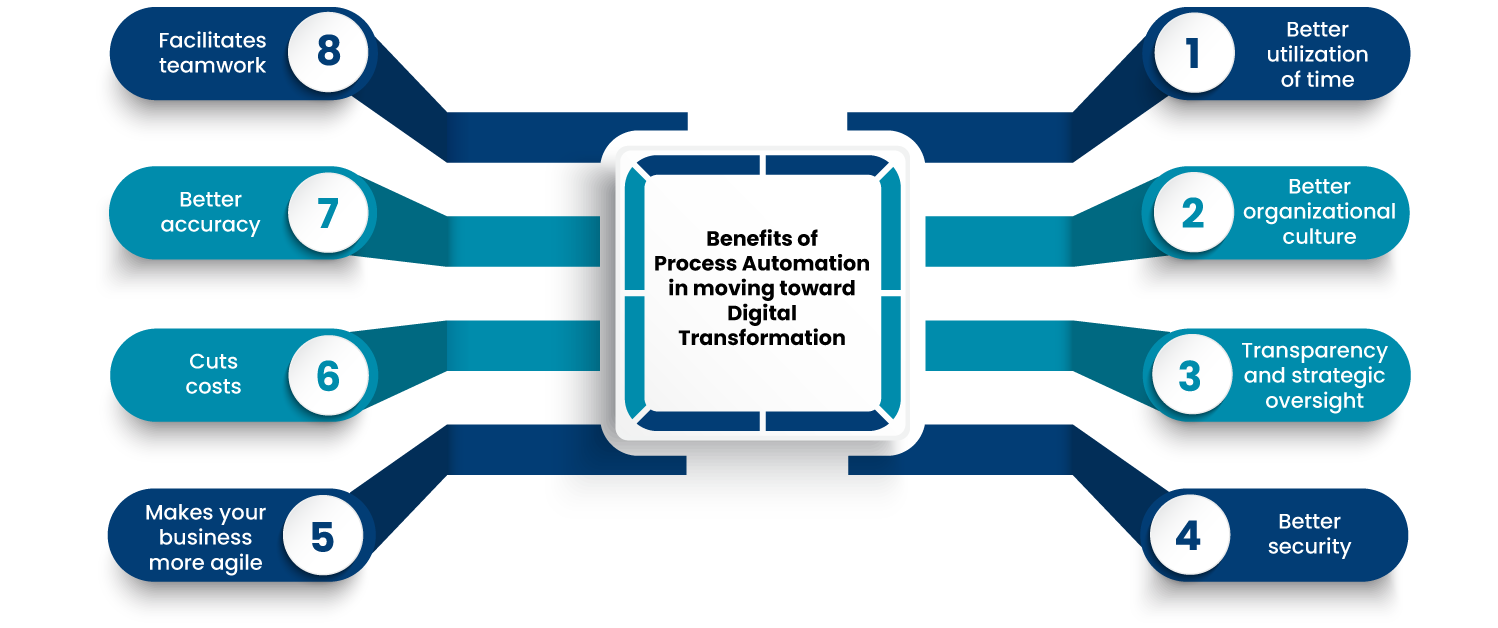
What if you could share organizational data across departments and ensure that everyone has timely access to information; what if certain events in one department automatically triggered work streams in another?
Well, you can. This can be done with process automation.
An effective system to automate your business processes can increase efficiency and improve communication across your organization. This would result in great customer service and give you a competitive edge, thus, moving forward with your company’s digital transformation.
Let’s dig deeper into this topic and its role in accelerating digital transformation!
Digital transformation – Why has it become crucial?
According to research by Forrester, “while 56% of firms are transforming, their level of investment and scope of transformation is still mostly small.”
According to research by Forrester, “while 56% of firms are transforming, their level of investment and scope of transformation is still mostly small.”
So what is digital transformation? It is basically leveraging the digital tools available to you – such as process automation and analytics – to change the way your company operates and carries out its decision making at its foundation.
The retail sector’s worldwide digital transformation market has reached a significant level and is projected to expand at an 18.2% Compound Annual Growth Rate (CAGR) by the year 2026.
Digital transformation has turned imperative in the current market environment. The companies not adopting these tools to further their digital transformation are suffering and lagging behind their competitors.
Here are three major reasons why digital transformation has become essential:

1. Larger Scale
Along with the size, the composition of an organization grows with it. This involves data volumes, users, transactions, etc. To keep up with this growing scale, digital transformation is important.
2. More Complex
Far more complex environments constitute today’s businesses. Broader endpoints, public and private clouds, different application architecture, etc. This complexity can be simplified through the automation of processes to aid digital transformation.
3. Innovation
The pace of change has to be sped up by the organization according to the innovation pace of the market. Adoption of process automation would assist this and further transformation digitally.
Companies like Netflix and Salesforce have reimagined their businesses working and come to the top by disrupting their industries using the technology available to them. They are known to be front-liners in digital transformation.
Achieving digital transformation is a continuous end goal, and its means is the automation of processes.
Also read: Big vs Fast Companies
Before we jump deeper, let’s understand what a process really is.
What is A Business Process?
A business process is a set of connected activities that lead to the achievement of an organizational goal that typically ends with the client receiving a product or availing of the benefits of a service.
The inputs involved in business processes are generally clearly defined in nature and lead to a single output that adds value to the organization. These inputs, when linked as meaningful tasks together, create a business process; a lot of business processes are repetitive and are part of the day-to-day workflow.
Such processes can be automated.
Process Automation
Process Automation is a brilliant way to aid collaboration and coordination throughout the organization. It may even be said that it is the key to attaining digital transformation.
For example, If a starter onboarding process was set up to inform all departments then workflows could be started across the organization to ensure a smooth induction and a great employee experience. This means you would get your staff up to speed and effective in their new roles quicker and less expensively with less manpower utilization.
Implementation of automation for daily workflows and operations throughout the business will benefit not only the IT team but every single team working in the organization.
The term “process automation” is not a limited term. There is automation for business processes (from a macro perspective) and within that comes a subset called robotic process automation (RPA) as well.
Watch the Webinar: Learn how to Automate Processes 10X faster with Quixy
BPA – Business Process Automation
Business Process Automation is the in-depth automation of an entire process for across-the-board efficiency. It builds a solution from the ground up and often impacts the whole organization.
BPA enables the reduction of costs and higher productivity through streamlining processes. It is regarded as a sort of stepping stone to digital transformation that can give your organization more clarity and transparency in business processes.
Through BPA, consistent standards are maintained; this standardization brings in customer satisfaction and creates a foundation where digital transformation can be possible.
BPA does not focus on any one department or process; it has a meta outlook on the organization and sees which tasks can be automated to increase efficiency. Therefore, it involves creating a solution for the business inefficiencies from scratch rather than just the optimization of existing processes.
With that being said, there is also RPA – Robotic Process Automation.
RPA – Robotic Process Automation
By contrast, Robotic Process Automation is task-oriented automation that eliminates one or two existing manual processes for greater efficiency and less error. RPA offers simplicity and easy adoption and generally forms a subset of the overall BPA initiative.
As per Forrester, RPA is the ultimate low-touch approach for process improvement. RPA assumes that the process will stay as-is and builds bots that replace low-value human hours. Populating tables, quality and testing, desktop consolidation, and replacing data entry tasks are typical targets.
Also Read: 23 Must-Have Features of a BPM Platform that you definitely need!
Benefits of process automation in moving toward digital transformation

1. Better utilization of time
If employees are busy using their time to chase approvals internally, they cannot interact with or be available to customers when required. This tanks customer satisfaction, and employees would be stuck doing manual unrewarding tasks.
Automation of processes aids digital transformation by freeing up the time of the employees so as to focus on aspects of work that actually matter, such as interacting and solving customers’ problems and not repetitive, unnecessarily manual, error-prone tasks.
2. Better organizational culture
The success of a business is dependent on its employees; they are not as meaningfully productive as they can be if they are not engaged in the work they are doing.
By having more citizen developers in the mix using low-code no-code platforms that have simple visual interfaces to automate workflow and processes, the pressure on IT can be eased and the employees would feel like they were contributing well to the organization’s work.
Also read: Citizen Developer vs Professional Developer
Digital transformation is furthered by process automation as it provides employees with a better workplace and organizational culture by giving them the space to work on more challenging, creative, rewarding, and engaging tasks. It enables teamwork by enabling collaboration between departments.
3. Transparency and strategic oversight
There is automatic transparency in working when abundant data is regulated and tracked. More visibility in the tasks that are successfully automated can reveal more such tasks that can be optimized.
Automating processes aids strategic oversight by making business processes more transparent; this aids risk assessment and positioning and allows better value propositions. This contributes to digital transformation.
4. Better security
Automation makes businesses more proactive in their approach – fixes can be created before breaches occur by the identification of vulnerabilities. Softwares and platforms help in detecting risks and violations.
It makes security better and enables compliance. In fact, 47% of businesses mentioned this as their reasoning behind adopting automation, according to a RedHat survey conducted recently.
47% of businesses mentioned better security and enabling compliance as their reasoning behind adopting automation according to a RedHat survey conducted recently.
5. Makes your business more agile
Businesses are able to reduce complexities, improve efficiency, and encourage collaboration through the automation of processes. Moreover, businesses can take up initiatives much faster, such as making changes asked for by the clients or introducing new products in an easier manner.
Thus, automating your processes adds agility to your business by responding to new opportunities at the right time.
6. Cuts costs
Not only would a business save hundreds of working hours by adopting the automation of processes, but it would also save a lot of money that would otherwise be spent on wasteful items like paper and ink.
Therefore, digital transformation can be moved toward quite literally as process automation enables saving funds and less wastage of resources by ultimately cutting costs.
7. Better accuracy
The automation of processes is bound to improve the accuracy of a company as the repetitive manual tasks are done automatically minus the errors. This increases efficiency and enables a larger scale of operations.
Digital transformation is facilitated when automation takes care of the grunt work, and the employees can focus on critical business issues that lead to the growth and development of the company.
8. Facilitates teamwork
A sense of cooperation is created with process automation since every department is communicated the information and workflows to be known to them in a timely fashion. Employees are given an insight into the entire business by a better understanding of their functions.
This enables teamwork which is critical for the digital transformation of any company to be successful. Departmental collaboration is a prerequisite for the working of a company.
Also Read: Digital Leadership in a New Era and How Workplace Culture Matters More Than Ever
All of these benefits, in some way or another other, can aid in furthering the digital transformation of your business. While automation is not synonymous with digital transformation, it is definitely a crucial part of the process.
How to automate processes?
It can be facilitated through Artificial Intelligence, Machine learning, low-code no-code platforms, BPM (Business Process Management), and/or RPA (Robotic Process Automation) tools.
Automation has truly become a requirement in today’s fast-paced and dynamic business environment. The amount of data out there is massive and needs leveraging of powerful capabilities through platforms.
Have you tried Quixy?
Quixy is a low-code no-code platform that can aid in facilitating digital transformation due to the ease and simplicity with which complex operations can be automated and streamlined, all for the betterment and development of your business.
It uses a visual interface and a simple drag-and-drop system where application components can be connected meaningfully to aid in automating workflows. Citizen development is facilitated by this.
Don’t miss out on the chance to elevate your processes. Take the first step and get started with Quixy today.
Frequently Asked Questions(FAQs)
Q. How Process Automation Accelerates Digital Transformation?
Implementing process automation in digital transformation yields significant benefits. It enhances operational efficiency, reduces costs through streamlined workflows, and boosts agility, allowing organizations to adapt swiftly to market changes. Moreover, it improves the overall customer experience, accelerates time-to-market for products and services, and provides valuable data insights, fostering innovation and competitive advantage in the rapidly evolving digital landscape.
Q. How Can Process Automation Improve Collaboration Across Departments?
Process automation fosters collaboration across departments by breaking down silos and facilitating seamless information exchange. Automated workflows ensure that relevant data is readily accessible to all stakeholders, promoting real-time collaboration. This leads to better communication, shared insights, and coordinated efforts, enhancing overall efficiency and productivity as departments work cohesively toward common goals. Quixy, as a versatile process automation platform, excels in promoting cross-departmental collaboration with its intuitive and collaborative features.
Q. What Challenges does Process Automation address in Digitalization?
Process automation addresses various challenges in the digital transformation journey. It mitigates operational bottlenecks, reduces manual errors, and enhances efficiency. The automation of complex tasks streamlines workflows, promoting a faster time-to-market. It also ensures regulatory compliance, minimizes risks associated with manual processes, and fosters a culture of innovation by freeing up resources for strategic initiatives. Quixy, as a comprehensive automation platform, empowers organizations to overcome these challenges seamlessly.
Q. How Does Process Automation Ensure Compliance and Risk Management?
Process automation ensures compliance and risk management by enforcing standardized procedures and reducing human errors. Automated workflows follow predefined rules, promoting adherence to regulatory requirements. Real-time monitoring and audit trails provide transparency, aiding in compliance audits. Additionally, automation identifies and mitigates risks promptly, preventing potential issues. Quixy, as a robust automation platform, incorporates features that enhance compliance and risk management in various business processes, ensuring a secure and regulated digital environment.
Login
Please login to comment
0 Comments
Oldest
















